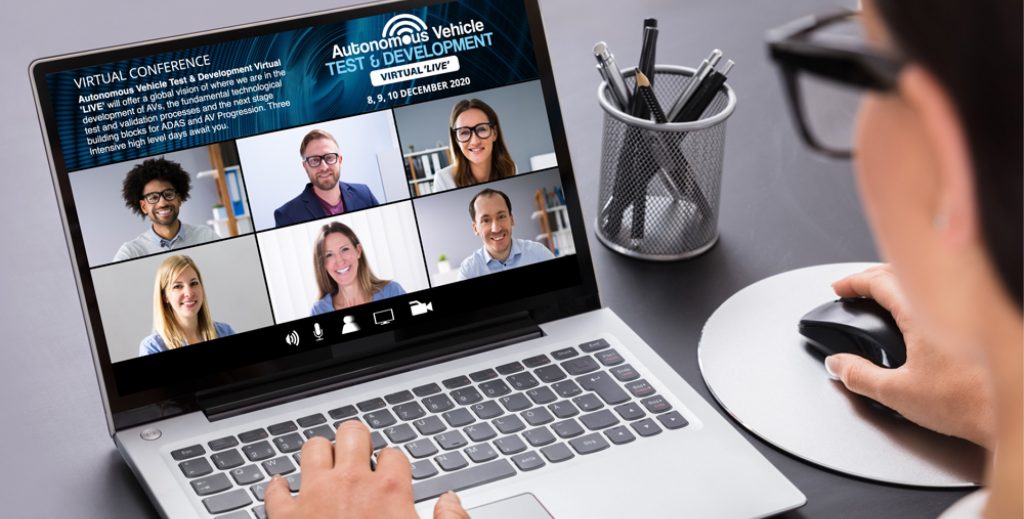AV engineers and developers searching for a global overview of the trends and technologies shaping AV development, test and validation will be able to hear the latest thoughts from experts at BMW, Renault, Volvo, and more at the forthcoming Autonomous Vehicle Test & Development Virtual ‘Live’ (December 8, 9, 10, 2020) – a free-to-attend, brand new, three-day, online conference.
Participants can expect a highly rewarding and insightful exchange of ideas, with live interaction and networking fully enabled and encouraged during the event, which takes place online for maximum convenience. Here’s just a few of the highlights in store:
Enabling virtual test and validation: creating a virtual proof of validation in the ENVITED ecosystem
 Carlo van Driesten, systems architect for virtual test and validation, BMW Group, will argue new forms of cooperation are necessary to turn the vision of autonomous driving and fully connected mobility systems into reality. Virtual validation is an essential part of the development process. Standards for model and system interchange are vital for cross-company and cross-domain virtual integration and simulation of HAD functions. Standards like FMI, SSP and the OpenX at ASAM eV showcase current possibilities, challenges and future directions, as well as a vision of future collaborations. The foundations for the future ecosystem have been laid by the ENVITED ecosystem: standardized data for virtual test and validation; open and modular simulation architecture; traceability of standardized data and test results for a virtual proof of validation.
Carlo van Driesten, systems architect for virtual test and validation, BMW Group, will argue new forms of cooperation are necessary to turn the vision of autonomous driving and fully connected mobility systems into reality. Virtual validation is an essential part of the development process. Standards for model and system interchange are vital for cross-company and cross-domain virtual integration and simulation of HAD functions. Standards like FMI, SSP and the OpenX at ASAM eV showcase current possibilities, challenges and future directions, as well as a vision of future collaborations. The foundations for the future ecosystem have been laid by the ENVITED ecosystem: standardized data for virtual test and validation; open and modular simulation architecture; traceability of standardized data and test results for a virtual proof of validation.New approaches for AV certification: a European perspective
 Maria-Cristina Galassi, scientific project officer, European Commission, believes automated driving technology is developing at an unprecedented rate. She will use her presentation to argue that a quick response is needed from regulators in order not to obstruct innovation, and at the same time ensure market access to safe AVs. Maria-Cristina believes the introduction of innovative certification approaches is required to assess and verify AV safety, complementing conventional physical testing in order to ensure safe vehicle performance in real life. Her presentation will introduce the proposed EU method for automated driving, including audit of the manufacturer design/development process, verification through track and on-road testing, and operational feedback from real-life experience after market introduction.
Maria-Cristina Galassi, scientific project officer, European Commission, believes automated driving technology is developing at an unprecedented rate. She will use her presentation to argue that a quick response is needed from regulators in order not to obstruct innovation, and at the same time ensure market access to safe AVs. Maria-Cristina believes the introduction of innovative certification approaches is required to assess and verify AV safety, complementing conventional physical testing in order to ensure safe vehicle performance in real life. Her presentation will introduce the proposed EU method for automated driving, including audit of the manufacturer design/development process, verification through track and on-road testing, and operational feedback from real-life experience after market introduction.ADAS/AD virtual end-to-end software development
 Clara Marina Martinez, engineer – ADAS virtual development, Porsche Engineering Services, is more aware than most that ADAS/AD software development needs to cope with complex sensor systems, plentiful corner cases still to be discovered and a cumbersome number of kilometres to test/certify. “These tasks require high support from virtualisation to be achievable under challenging deadlines and at a reasonable cost,” she says. “The perfect tool that gathers all your requirements does not exist.” However, during her presentation, she will show how many high-quality software solutions are able to simulate sensors, traffic, vehicle dynamics, driver behaviour and realistic environments with the level of detail required; and how Porsche Engineering is bringing together the best tools, data sources and its extensive experience in automotive, to create a flexible simulation platform to support end-to-end ADAS development.
Clara Marina Martinez, engineer – ADAS virtual development, Porsche Engineering Services, is more aware than most that ADAS/AD software development needs to cope with complex sensor systems, plentiful corner cases still to be discovered and a cumbersome number of kilometres to test/certify. “These tasks require high support from virtualisation to be achievable under challenging deadlines and at a reasonable cost,” she says. “The perfect tool that gathers all your requirements does not exist.” However, during her presentation, she will show how many high-quality software solutions are able to simulate sensors, traffic, vehicle dynamics, driver behaviour and realistic environments with the level of detail required; and how Porsche Engineering is bringing together the best tools, data sources and its extensive experience in automotive, to create a flexible simulation platform to support end-to-end ADAS development.Validating ADS toward an industrial scenarios database
 Marc Pajon, expert leader – testing and measurement technologies, Renault Group, believes separately track-testing sensors and driving algorithms is hardly sufficient to demonstrate AV safety. Instead, he will argue that scenario-based simulation approaches are necessary complements to the traditional approach, allowing computation of a controlled diversity of key variables in many iterations in a safe, fast and documented way. During his presentation, Pajon will show how Renault and PSA, together with academic researchers (VEDECOM, SystemX, Lab and Ceesar) and other partners (Valeo, AVS and Expleo), propose to address the challenge of demonstrating AV safety by taking into account an array of ‘in-the-field’ situations.
Marc Pajon, expert leader – testing and measurement technologies, Renault Group, believes separately track-testing sensors and driving algorithms is hardly sufficient to demonstrate AV safety. Instead, he will argue that scenario-based simulation approaches are necessary complements to the traditional approach, allowing computation of a controlled diversity of key variables in many iterations in a safe, fast and documented way. During his presentation, Pajon will show how Renault and PSA, together with academic researchers (VEDECOM, SystemX, Lab and Ceesar) and other partners (Valeo, AVS and Expleo), propose to address the challenge of demonstrating AV safety by taking into account an array of ‘in-the-field’ situations.
SOTIF in a Volvo Cars context
 Carina Björnsson, technical expert, driver assistance and active safety test methods, Volvo Car Corporation will share how Volvo Cars has developed cars with ADAS since the beginning of 2000 and how its ambition is and always has been to make safe cars. How does the SOTIF ISO/PAS 21448 affect active safety development? Are we perhaps fulfilling the SOTIF PAS already? How did we handle non-ISO hazards before SOTIF PAS existed? Carina’s presentation will answer these questions and explore some use cases/examples where SOTIF affects the product.
Carina Björnsson, technical expert, driver assistance and active safety test methods, Volvo Car Corporation will share how Volvo Cars has developed cars with ADAS since the beginning of 2000 and how its ambition is and always has been to make safe cars. How does the SOTIF ISO/PAS 21448 affect active safety development? Are we perhaps fulfilling the SOTIF PAS already? How did we handle non-ISO hazards before SOTIF PAS existed? Carina’s presentation will answer these questions and explore some use cases/examples where SOTIF affects the product.


